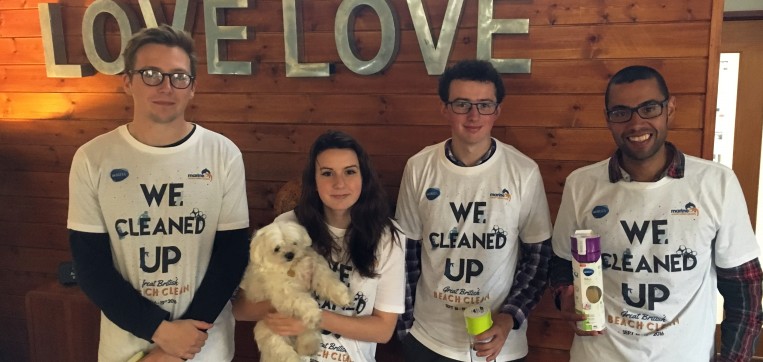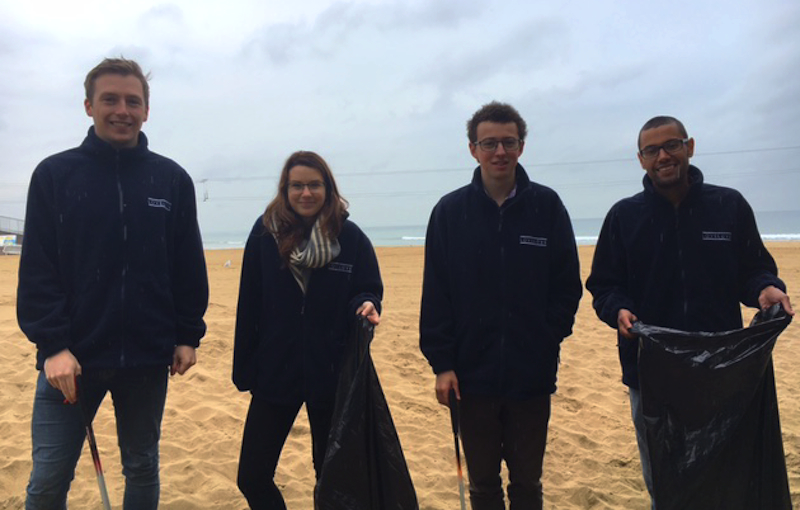
- Posted by info 20 Sep
LoveLove Films’ Great British Beach Clean
The Great British Beach Clean – what is it and why does it matter?
Britain’s beaches have long been the destination of choice for holidaymakers wanting to indulge in a ‘staycation’ – a break from the stresses of everyday life without leaving home shores. The traditional image of the quintessential beach holiday conjures images of buckets and spades, beach balls, ice creams and (occasionally) sunny afternoons that last forever. But have you ever spared a thought for the environmental impact that the crowds have on our coastal resorts? Or the wider impact of shipping-based and industrial waste that can – and does – find its way into the sea, and is eventually washed up on our shores? This is where The Great British Beach clean comes in.
Everyday items such as plastic bottles, carrier bags, broken glass, bottle tops and cigarette butts pose a massive threat to the natural beauty and safe operation of beaches throughout the United Kingdom and Europe…but it isn’t all doom and gloom. The Marine Conservation Society‘s Great British Beach Clean is a volunteer-lead initiative that encourages the general public to get involved and help to clear our beaches of rubbish and maritime waste during an annual four-day blitz every September; and since it began in 1994 the Beach Clean has removed thousands of items of litter from hundreds of kilometres of beach.
On 19th September 2016, a team from LoveLove Films joined the Great British Beach Clean at Bournemouth Beach and helped to remove as many tin cans, cigarette butts, plastic bottles and sweet wrappers as possible. Armed with rubbish bags and litter pickers Shannon, Sam, Tom and Jacob braved the wind and rain and got involved under the shadow of the famous pier. It wasn’t all about picking up bottle tops though – the trip proved to be an educational one too, as one of the Beach Clean’s coordinators explained that the activity isn’t simply about cleaning unsightly junk from the coastline: it can also help to change government legislation (and public attitudes) on waste.

Some of LoveLove Films enjoying the great British weather!
For example, the recent 5p levy on single use plastic carrier bags was in part brought about due to statistical evidence collected by the Marine Conservation Society, where it was shown that there was a 47% drop in plastic bags washed up on Welsh beaches between 2014 and 2015. The battle is yet to be won however, as the Marine Conservation Society is still to convince governments that sanitary wet wipes marketed as ‘flushable’ should be re-branded due to the high proportion that end up being flushed down the toilet, but end up on Britain’s beaches having been washed ashore by the tide. Further to this, wet wipes are often made from plastic fibres which don’t disintegrate or biodegrade like paper fibres and are often eaten by fish and other wildlife.
Waste plastic is a major concern for environmental conservation groups across the globe, as illustrated in a 2014 report by Plastic Change. Plastic Change is an international organisation based in Denmark which exists to raise awareness of the dangers of plastic waste, and the 2014 report makes for a sobering read. According to founder Henrik Beha Pedersen, there will be “one tonne of plastic for every three tonnes of fish in the ocean by 2025.” LoveLove Films is passionate about raising public awareness of the threat this waste poses through a series based on the subject, Bottle Island. Bottle Island is an educational series currently in development at LoveLove Films that aims to show children the importance of recycling, and what we can do to lessen the impact of rubbish on the environment.
In 2015 over 6000 volunteers took part in the Great British Beach Clean, and cleared waste from hundreds of beaches around the UK. The statistics from the 2016 initiative will be published at the end of 2016 and hopefully the numbers will reflect an upturn in cleanliness of our favourite holiday destinations.

Post Comments 0